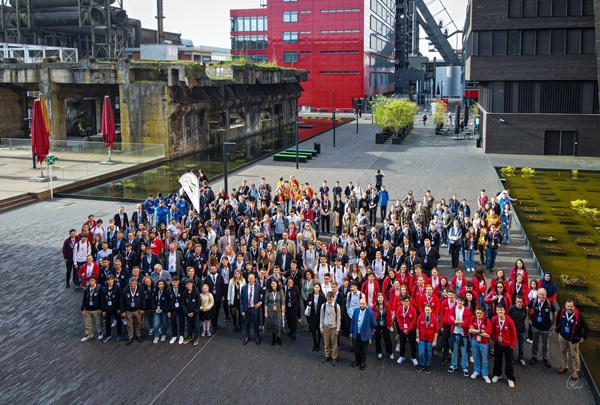 Credit: Jeff Kohnen
Credit: Jeff Kohnen
Luxembourg's Ministry of Education, Children and Youth has confirmed that the Grand Duchy recently hosted the 2024 European Olympiad of Experimental Science (EOES) with nearly 140 young people and 92 mentors from 25 countries coming to Luxembourg from 7 to 14 April 2024.
In this science competition, students from each country competed in teams of three to solve interdisciplinary problems in the fields of biology, chemistry and physics.
Of the 55 participating teams, seven won a gold medal, led by young representatives from the Czech Republic, the Netherlands and Germany. Fourteen silver medals and 24 bronze medals were also awarded. The two teams which represented Luxembourg in the competition counted among the bronze winners, namely:
- Team A - Max Brimmeyer (Athénée de Luxembourg), Jan Panuska (Mamer European School) and Jonas Baltramaitis (Kirchberg European School)
- Team B - Anna Landers (Lycée Classique Diekirch), Théodore Harf Wilwers (Lycée Aline Mayrisch Luxembourg) and Nicolas Bourg Rodrigues (Lycée Aline Mayrisch Luxembourg)
They were supervised by mentors Jacques Pir (Lycée Josy Barthel Mamer), Gilles Backes (Lycée de Garçons de Luxembourg) and Frank Thillen (Lycée Classique Diekirch).
The main objective of EOES is to help stimulate the talents of gifted students in science, support them to develop their skills and promote their future scientific careers, the ministry noted. The Olympiads also aim to allow the best young science students from across the European Union to meet and aim to help promote a positive image of science and scientists among the wider community.
The tests took place over two days, at the Limpertsberg Campus of the University of Luxembourg, on Tuesday 9 April and Thursday 11 April 2024. The tasks to be carried out by the teams of students aged seventeen and under were developed by a jury scientist, trained by the host country. The syllabi were then translated by the mentors in each country so that the students could work in their native language. The first event had the theme of cancer. For the second test, the candidates worked on the Schueberfouer. For example, they had to determine the volume of vinegar needed to prepare 90 g of mustard or the minimum trigger height for a ball to complete a complete loop and analyse under a microscope the differences between beef blood and fish blood.
According to the ministry, the competition week was also an opportunity to “cultivate a healthy mind in a healthy body” and to promote Luxembourg and its culture. To encourage exchanges, the young people were housed together at the Pfaffenthal youth hostel. An extensive cultural and social programme was planned: opening and closing ceremonies, rallies on the Belval Campus and across the capital, company visits, dance and djembe workshops, improvisation theatre, juggling, pottery, outings to the swimming pool, quiz evenings, sightseeing tours and more.
The European Experimental Sciences Olympiads are organised each year in a different country of the European Union. The 2024 edition was the second hosted in the Grand Duchy, after that of 2013. The event was managed by the non-profit organisation Luxembourg Olympiads in Natural Sciences in collaboration with the Ministry of Education, Children and Youth and its Department for the Coordination of Educational and Technological Research and Innovation (SCRIPT).









